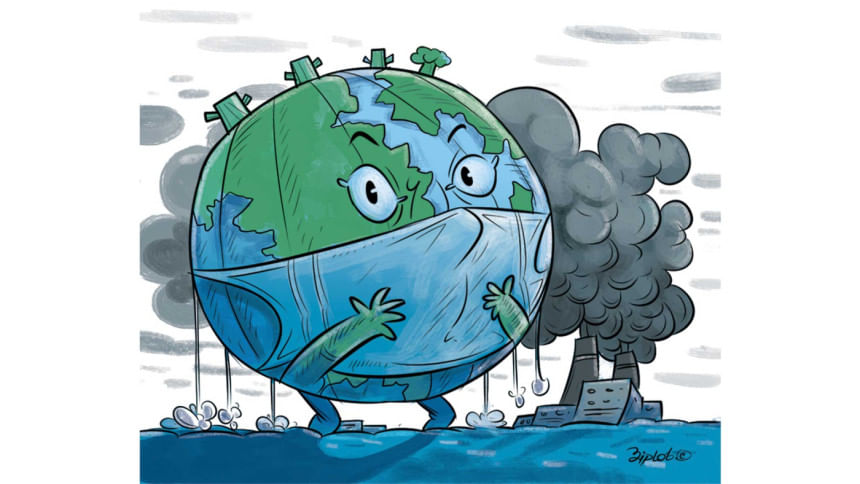Climate destroyers’ pledge to save Earth too little, too late

"Only when the last tree has been cut down, the last fish been caught, and the last stream poisoned, will we realise we cannot eat money."
A Native American proverb that says it all in such abundant eloquence, and we wonder, was the half-naked old chief of the misty mountain an illiterate man, or a wise one who knew what was going to happen to Planet Earth?
Men of the world, through their third eye, could envision what calamity would befall humans as they cut down trees, levelled hills, blocked streams, and polluted oceans with felonious consistency in the name of modernity and progress. The greedy men laughed away the words of caution and went about digging a mile-deep pit in search of diamonds and gold. The more they found them, the deeper they dug.
There are more plastic bottles and nylon nets in oceans than mackerels. Deep forests where birds and animals once built their safe homes now get bulldozed by humans to construct multistorey concrete cages for themselves. Mechanised vessels on rivers pollute water with burnt oil for fishes to choke on and die. Industries produce medicine for humans, but spew black smoke in the air for humans to choke and die. The more fossil fuel is burnt, the more the air heats up. The forests heat up. Clouds heat up. The cold Arctic zone heats up. Millennia-old ice melts down. Water level around the world rises. Torrential rains and floods hit low coastal areas. And then we hear the echo of the wise words of the old men of the misty mountain. They warned us: Do not abuse nature, for nature will strike back.
We see all around the vicious manifestation of calamities of unparalleled ferocity. Global temperature is about to cross the threshold. Massive ice blocks in the Himalayas are slowly melting to crash down on the human abodes below. The century-old climate pattern is no more familiar. Rains linger unabashedly; winter bids farewell sooner than expected.
Nature is on a path of revenge all around the world. Environmentalists may not want to say it in such a blunt way, but deep down they know there is truth in it. The seven-billion-plus human population is ripping asunder this little planet in their infinite greed for material gain, to make profit by selling whatever they can grab with their two hands. Their uncaring atrocities are contributing to severe disequilibrium in nature, which in turn is hastening the process of climate change globally.
Climate change is causing sea levels to rise, storms, cyclones, drought, land erosion, landslides, flooding, and salinisation, and these extreme weather conditions are forcing people to find refuge elsewhere in search of livelihood. Bangladesh finds itself on the forefront of these impacts.
The geographical location with low elevation, Bangladesh is extremely vulnerable to the frequent whims of nature. The high population density exacerbates its attempts to keep the wheels of the economy turning.
A study shows that by 2050, one in every seven people in Bangladesh will be a victim of climate change. And it further says that up to 18 million people may have to migrate because of sea level rise.
While humans continue to destroy nature to satiate their greed, they also take the liberty to coin the phrase "Climate Refugee." This is irony at its worst—a caustic joke on the hapless people in refugee camps. The term climate refugee connotes: "Persons or groups of persons who, for reasons of sudden or progressive climate-related changes in the environment that adversely affects their lives or living conditions, are obliged to leave their habitual homes either temporarily or permanently, and who move either within their country or abroad."
Here are some grim facts about Bangladesh. It is estimated that two-thirds of Bangladesh is less than five metres above the sea level. And as much as 28 percent of the population lives on the coastal belts, where frequent tidal flooding caused by sea level rise forces them to migrate to high grounds.
Another estimate says that by 2050, with a projected 50cm rise in sea level, Bangladesh may lose approximately 11 percent of its land, affecting an estimated 15 million people living in its low-lying coastal region. Farmers face salinity-related issues while farming on damaged lands. Arsenic in drinking water is still very much present in a good number of tube wells.
Against such a haunting background, world leaders, most of whom are from major polluting economies, tried to pacify the people with the declaration of a multibillion-dollar pledge to end deforestation by 2030. But environmental groups and protesters took the declaration with a great deal of scepticism and demanded more urgent action to save the planet. Though the pledge is backed by almost USD 20 billion in public and private funding, and has been endorsed by more than 100 leaders representing over 85 percent of the world's forests, including the Amazon rainforest, Canada's northern boreal forest and the Congo Basin rainforest, environmentalists are not convinced as to how much it will help to heal the deep wounds and stop the bleeding.
The leaders of the "industrialised" countries argued that the agreement on deforestation was important to the overarching goal of limiting temperature rises to 1.5 degrees Celsius—which was the most ambitious Paris Agreement target. But the fact remains that the extent of damage done to this beleaguered planet for the last 300 years or so, in the name of industrialisation and modernity, has been more severe than what the naked eyes can see.
The same destroyers and polluters from the industrialised countries, and their paid agents, said in sugar-coated words: "We can't deal with the devastating loss of habitat and species without tackling climate change and we can't tackle climate change without protecting our natural environment and respecting the rights of indigenous peoples. So protecting our forests is not only the right course of action to tackle climate change, but the right course for a more prosperous future for us all."
We wonder why it took them waiting for conferences like COP25 and COP26 to say all these things, and why could they not take actions decades ago?
The following countries are responsible for accelerating massive-scale deforestation in their respective territories: Brazil, Russia, the United States, China, Australia, and France. And they all put their signature on the agreement. They have done so before in many other summits and conferences on climate change and related issues. We are witness to their follow-up actions. Nothing worthwhile has been done as yet.
It is being said that it was a case of too little, too late at COP26. Planet Earth will not sit idle for the polluters to release their money for their pet organisations and groups to organise seminars to create awareness among the people about the adverse effects of climate change. Planet Earth will continue to take revenge.
Unfortunately, the polluters will read about this in newspapers, while the innocent victims will drown in distant Bangladesh.
Shahnoor Wahid is a freelance journalist.

 For all latest news, follow The Daily Star's Google News channel.
For all latest news, follow The Daily Star's Google News channel. 



Comments